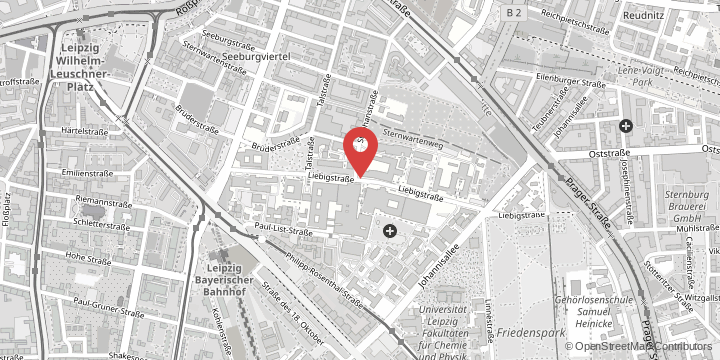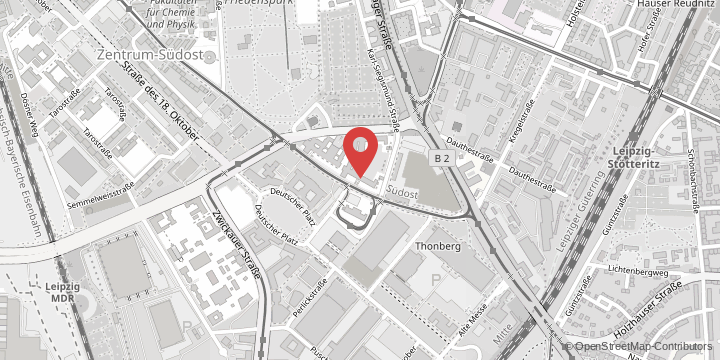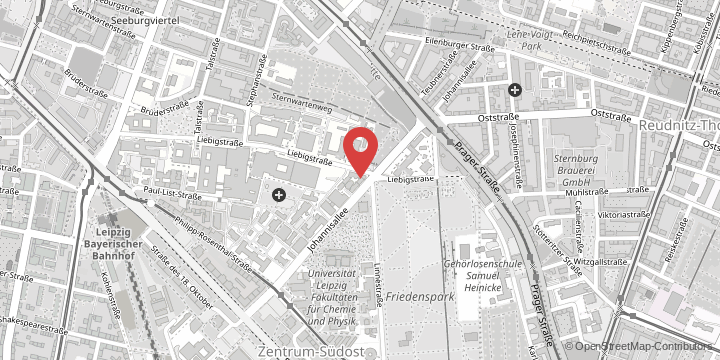Profile
Abstract
Jens Meiler graduated in chemistry at Leipzig University and then did his doctorate at the Johann-Wolfgang-Goethe University in Frankfurt under Christian Griesinger. From 2001 he was a postdoc at Washington University in Seattle. There he was involved in the development of the protein modeling software Rosetta in David Baker's group. In 2005 he was appointed to Vanderbilt University in Nashville. His research combines computer-aided processes with experimental methods in order to better understand proteins and their interactions with active substances and other biomolecules.
Jens Meiler develops computer-aided methods in the areas of: structure determination of membrane proteins, computer-aided drug research, and the design of new protein therapeutics. At the beginning of 2020, Jens Meiler became the director of the newly founded Institute for Drug Development at Leipzig University with a Humboldt Professorship.
Professional career
- since 01/2020
Humboldt Professor and Director of the Institute for Drug Discovery, Faculty of Medicine, Leipzig University - since 05/2005
Professor for Structural and Chemical Biology at Vanderbilt University, Nashville, USA - 09/2001 - 04/2005
Postdoctoral researcher at University of Washington, Seattle, USA
Education
- 09/1998 - 08/2001
Graduate Student at Goethe University Frankfurt am Main - 10/1994 - 08/1998
Undergraduate Student in Chemistry
Jens Meiler's research integrates innovative computational approaches of therapeutic design and discovery with experimental validation and optimization.
Specifically, we develop and apply new algorithms to engineer and identify small molecule drugs as well as biologics such as antibodies or vaccines. Therefore, we employ the Rosetta software suite (www.rosettacommons.org) as well as leveraging machine learning algorithms within the BioChemicalLibrary (BCL, www.meilerlab.org). We collaborate with scientists around the world to apply these new algorithms to pressing challenges in human health including cancer, infectious diseases such as Flu or HIV, diseases that affect the brain such as Schizophrenia or Addiction, cardiac arrhythmia, or adiposity/obesity. To effectively execute the iterative cycle of drug development, the Institute for Drug Development is equipped to produce, characterize, and test small molecule drugs as well as biologics. To enable our approach of rational, computer-driven therapeutic design in the first place, we also collaborate to determine in silico the structure of critical human and pathogen protein targets from often limited experimental data.
- show detailsSFB 1423/A07: Innovative artificial intelligence algorithms for modeling and docking of GPCRsMeiler, JensDuration: 01/2020 – ongoingFunded by: DFG Deutsche ForschungsgemeinschaftInvolved organisational units of Leipzig University: SFB 1423: Strukturelle Dynamik der GPCR-Aktivierung und Signaltransduktion; Pharmazeutische Chemie
- show detailsSFB 1423/Z04-INF: Data management and computational models of structure, dynamics and evolution of GPCRsMeiler, JensDuration: 01/2020 – ongoingFunded by: DFG Deutsche ForschungsgemeinschaftInvolved organisational units of Leipzig University: SFB 1423: Strukturelle Dynamik der GPCR-Aktivierung und Signaltransduktion; Bioinformatik; Pharmazeutische Chemie; Interdisziplinäres Zentrum für Bioinformatik (IZBI); Institut für Medizinische Physik und Biophysik
- show detailsPeptide-based crystallographic fragment screening for fast and efficient discovery of lead structures against zoonotic viral diseasesMeiler, JensDuration: 10/2021 – 09/2024Funded by: Stiftungen InlandInvolved organisational units of Leipzig University: Pharmazeutische Chemie
- show detailsSFB 1052/C8: Development of modulators at the chemokine-like receptor to elucidate its role in obesityMeiler, JensDuration: 07/2021 – 12/2024Funded by: DFG Deutsche ForschungsgemeinschaftInvolved organisational units of Leipzig University: Pharmazeutische Chemie; SFB 1052: Mechanismen der Adipositas
- show detailsSFB 1423/A04: Characterizing the molecular interaction between the Y receptor and arrestinHuster, DanielDuration: 01/2020 – ongoingFunded by: DFG Deutsche ForschungsgemeinschaftInvolved organisational units of Leipzig University: Biochemie/Bioorganische Chemie; Institut für Medizinische Physik und Biophysik; SFB 1423: Strukturelle Dynamik der GPCR-Aktivierung und Signaltransduktion
- show detailsMukherjee, S.; Cassini, T. A.; Hu, N. et al.Personalized structural biology reveals the molecular mechanisms underlying heterogeneous epileptic phenotypes caused by de novo KCNC2 variantsHuman Genetics and Genomics Advances. 2022. 3 (4).
- show detailsAslanoglou, D.; Bertera, S.; Friggeri, L.; Sanchez-Soto, M.; Lee, J.; Xue, X.; Logan, R. W.; Lane, J. R.; Yechoor, V. K.; McCormick, P. J.; Meiler, J.; Free, R. B.; Sibley, D. R.; Bottino, R.; Freyberg, Z.Dual pancreatic adrenergic and dopaminergic signaling as a therapeutic target of bromocriptineiScience. 2022. 25 (8).
- show detailsSala, D.; del Alamo, D.; Mchaourab, H. S.; Meiler, J.Modeling of protein conformational changes with Rosetta guided by limited experimental dataStructure. 2022. 30 (8). pp. 1157–1168.e3.
- show detailsBrown, B. P.; Vu, O.; Geanes, A. R.; Kothiwale, S.; Butkiewicz, M.; Lowe, E. W.; Mueller, R.; Pape, R.; Mendenhall, J.; Meiler, J.Introduction to the BioChemical Library (BCL): An Application-Based Open-Source Toolkit for Integrated Cheminformatics and Machine Learning in Computer-Aided Drug DiscoveryFrontiers in pharmacology. 2022.
- show detailsBorza, C. M.; Bolas, G.; Zhang, X. et al.The Collagen Receptor Discoidin Domain Receptor 1b Enhances Integrin beta 1-Mediated Cell Migration by Interacting With Talin and Promoting Rac1 ActivationFrontiers in cell and developmental biology. 2022.
- show detailsInstitut für Medizinische Physik und BiophysikBioinformaticsStart Date of Collaboration: 01/02/2018External participating organisations: Vanderbilt University (Nashville, United States)Involved persons: Hildebrand, Peter Werner Richard; Meiler, Jens
- show detailsOrganische Chemie/Chemische Biologie; Biotechnologisch-Biomedizinisches Zentrum (BBZ)Bindungsmodi niedermolekularer Hemmstoffe von Protein-Protein-WechselwirkungenStart Date of Collaboration: 06/10/2011External participating organisations: Vanderbilt University (Nashville, United States)Involved persons: Berg, Thorsten; Meiler, Jens
- show detailsInstitut für Medizinische Physik und BiophysikStrukturuntersuchungen von G-Protein-gekoppelten RezeptorenStart Date of Collaboration: 01/01/2011External participating organisations: Vanderbilt University (Nashville, United States)Involved persons: Huster, Daniel; Meiler, Jens; Sanders, Chuck
- show detailsBiochemie/Bioorganische Chemie; Institut für Biochemie; Biotechnologisch-Biomedizinisches Zentrum (BBZ)Vanderbilt-Leipzig Collaboration: International Student and Research Exchange ProgrammeStart Date of Collaboration: 01/01/2009External participating organisations: Vanderbilt University (Nashville, United States)Involved persons: Beck-Sickinger, Annette; Meiler, Jens; Albrecht, Anett
- show detailsBiochemie/Bioorganische Chemie; Institut für Biochemie; Biotechnologisch-Biomedizinisches Zentrum (BBZ)Small Molecule Probes to investigate Structure and Funktion of Y-ReceptorsExternal participating organisations: Vanderbilt University (Nashville, United States)Involved persons: Beck-Sickinger, Annette; Meiler, Jens































































